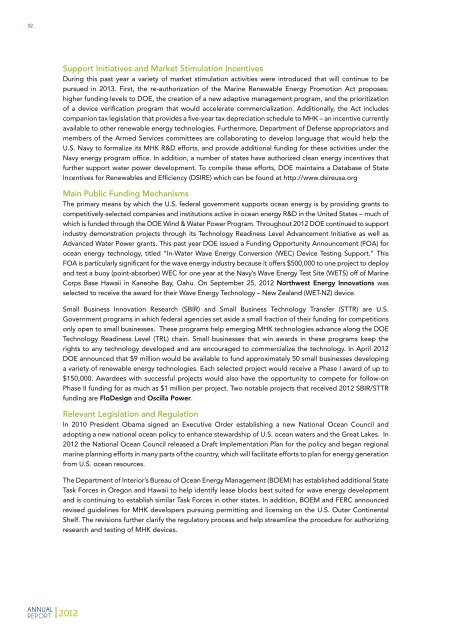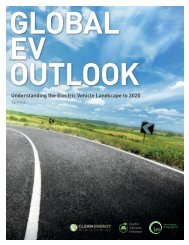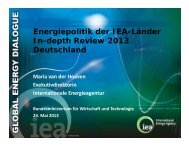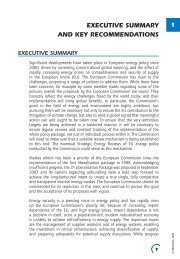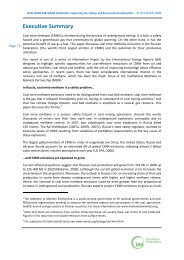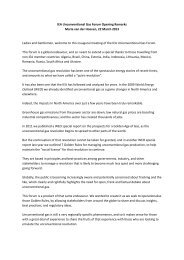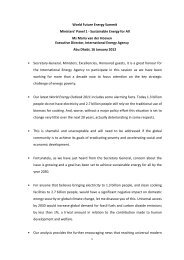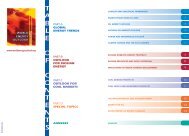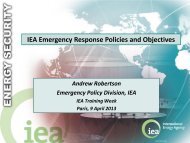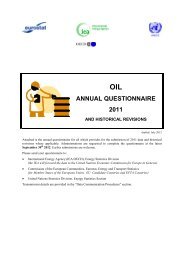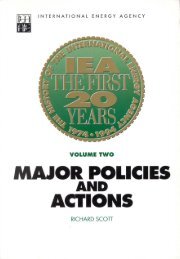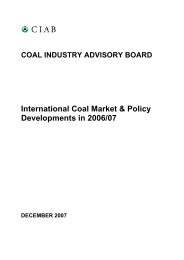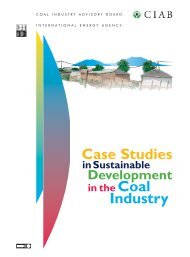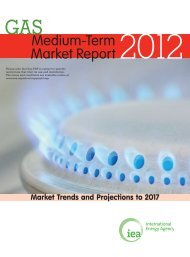OES Annual Report 2012 - Ocean Energy Systems
OES Annual Report 2012 - Ocean Energy Systems
OES Annual Report 2012 - Ocean Energy Systems
Create successful ePaper yourself
Turn your PDF publications into a flip-book with our unique Google optimized e-Paper software.
52<br />
Support Initiatives and Market Stimulation Incentives<br />
During this past year a variety of market stimulation activities were introduced that will continue to be<br />
pursued in 2013. First, the re-authorization of the Marine Renewable <strong>Energy</strong> Promotion Act proposes:<br />
higher funding levels to DOE, the creation of a new adaptive management program, and the prioritization<br />
of a device verification program that would accelerate commercialization. Additionally, the Act includes<br />
companion tax legislation that provides a five-year tax depreciation schedule to MHK – an incentive currently<br />
available to other renewable energy technologies. Furthermore, Department of Defense appropriators and<br />
members of the Armed Services committees are collaborating to develop language that would help the<br />
U.S. Navy to formalize its MHK R&D efforts, and provide additional funding for these activities under the<br />
Navy energy program office. In addition, a number of states have authorized clean energy incentives that<br />
further support water power development. To compile these efforts, DOE maintains a Database of State<br />
Incentives for Renewables and Efficiency (DSIRE) which can be found at http://www.dsireusa.org<br />
Main Public Funding Mechanisms<br />
The primary means by which the U.S. federal government supports ocean energy is by providing grants to<br />
competitively-selected companies and institutions active in ocean energy R&D in the United States – much of<br />
which is funded through the DOE Wind & Water Power Program. Throughout <strong>2012</strong> DOE continued to support<br />
industry demonstration projects through its Technology Readiness Level Advancement Initiative as well as<br />
Advanced Water Power grants. This past year DOE issued a Funding Opportunity Announcement (FOA) for<br />
ocean energy technology, titled “In-Water Wave <strong>Energy</strong> Conversion (WEC) Device Testing Support.” This<br />
FOA is particularly significant for the wave energy industry because it offers $500,000 to one project to deploy<br />
and test a buoy (point-absorber) WEC for one year at the Navy’s Wave <strong>Energy</strong> Test Site (WETS) off of Marine<br />
Corps Base Hawaii in Kaneohe Bay, Oahu. On September 25, <strong>2012</strong> Northwest <strong>Energy</strong> Innovations was<br />
selected to receive the award for their Wave <strong>Energy</strong> Technology – New Zealand (WET-NZ) device.<br />
Small Business Innovation Research (SBIR) and Small Business Technology Transfer (STTR) are U.S.<br />
Government programs in which federal agencies set aside a small fraction of their funding for competitions<br />
only open to small businesses. These programs help emerging MHK technologies advance along the DOE<br />
Technology Readiness Level (TRL) chain. Small businesses that win awards in these programs keep the<br />
rights to any technology developed and are encouraged to commercialize the technology. In April <strong>2012</strong><br />
DOE announced that $9 million would be available to fund approximately 50 small businesses developing<br />
a variety of renewable energy technologies. Each selected project would receive a Phase I award of up to<br />
$150,000. Awardees with successful projects would also have the opportunity to compete for follow-on<br />
Phase II funding for as much as $1 million per project. Two notable projects that received <strong>2012</strong> SBIR/STTR<br />
funding are FloDesign and Oscilla Power.<br />
Relevant Legislation and Regulation<br />
In 2010 President Obama signed an Executive Order establishing a new National <strong>Ocean</strong> Council and<br />
adopting a new national ocean policy to enhance stewardship of U.S. ocean waters and the Great Lakes. In<br />
<strong>2012</strong> the National <strong>Ocean</strong> Council released a Draft Implementation Plan for the policy and began regional<br />
marine planning efforts in many parts of the country, which will facilitate efforts to plan for energy generation<br />
from U.S. ocean resources.<br />
The Department of Interior’s Bureau of <strong>Ocean</strong> <strong>Energy</strong> Management (BOEM) has established additional State<br />
Task Forces in Oregon and Hawaii to help identify lease blocks best suited for wave energy development<br />
and is continuing to establish similar Task Forces in other states. In addition, BOEM and FERC announced<br />
revised guidelines for MHK developers pursuing permitting and licensing on the U.S. Outer Continental<br />
Shelf. The revisions further clarify the regulatory process and help streamline the procedure for authorizing<br />
research and testing of MHK devices.<br />
ANNUAL<br />
REPORT <strong>2012</strong>


